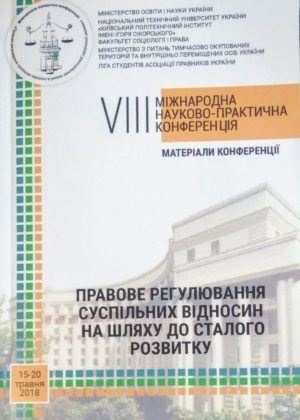
«I personally guarantee that we will honestly and decently do our job!»
Managing partner
Lawyer, Doctor of Laws, recognized media expert on legal issues, legal adviser to famous politicians and businessmen.
CORRUPTION AS A SOCIO-LEGAL PHENOMENON: COMPARATIVE ANALYSIS WITH INTERNATIONAL LAW
 Corruption is one of the phenomena that can create crisis conditions in various fields of social and social development of each state, first of all it concerns politics, economy, and public administration. Considering corruption as a social and legal phenomenon, it will be appropriate to conduct a comparative analysis of this phenomenon, in the context of different countries of the world. Let's start with the definition of this concept in foreign legal literature.
Corruption is one of the phenomena that can create crisis conditions in various fields of social and social development of each state, first of all it concerns politics, economy, and public administration. Considering corruption as a social and legal phenomenon, it will be appropriate to conduct a comparative analysis of this phenomenon, in the context of different countries of the world. Let's start with the definition of this concept in foreign legal literature.
In particular, Article 6 of this Convention stipulates that acts of corruption are:
- attempt to obtain or receive, directly or indirectly, a government official or a person performing public functions, any items of monetary value, as well as other benefits such as a gift, a service, a promise or advantage for himself or another person or organization in exchange for any act or omission in the exercise of public functions;
- the offer or provision, directly or indirectly, to a government official or a person performing public functions, monetary items, as well as other benefits such as a gift, a service, a promise or advantage for himself or another person or organization, in exchange for any other person, what action or omission in the exercise of its public functions;
- any act or omission in the performance of their duties by a government official or a person performing public functions for the purpose of unlawfully making a profit for himself or the other party;
- fraudulent use or concealment of property derived from the commission of one of the acts referred to in this article;
participation as a principal executor, accomplice, contributor, manual, or accomplice after committing, or in any other way, in the commission or commission of an act, also in aiding or abetting, for the purpose of committing one of the acts referred to in this article".
The Council of Europe Convention on Corruption in the Context of Criminal Justice (ETS 173) in Chapter Two, entitled "Measures taken at the national level", defined the measures to be implemented by each State that may be necessary to establish liability for certain acts recognized the above-mentioned Convention as corrupt. Yes, to corrupt acts include:
- giving bribes to national public officials consisting in the promise, offering or giving by any person, directly or indirectly, of any unlawful benefit to any public official in his country, for them personally or for other persons, with a view to encouraging them to performance or non-fulfillment of the powers granted to them;
- the receipt of bribes by national public officials, expressed in the following actions: extortion, receipt, directly or indirectly, of any unlawful benefit for them personally or for other persons, or acceptance of a proposal or promise of such a blanket for the purpose of performing or not fulfilling the powers granted to them.
In addition, the Convention mentions the bribery of various officials, in particular, the bribery of the members of the national public (legislative) assembly, bribery of foreign officials, bribery of members of foreign public (legislative) assemblies. At the same time, a distinction is made between dacha and receiving a bribe depending on the sphere of public life. Thus, the above acts can be attributed to bribery in the public sector. Acts of the same, listed in Art. 7 and art. 8, to bribery in the private sector of public life.
The Convention also specifies the need to establish responsibility for bribery by officials of international organizations and bribery of members of international parliamentary (legislative) assemblies, bribery of judges and officials of international courts.
Another international legal act that describes the definition of corruption is the Council of Europe Convention on Corruption in the Field of Civil Law (ETS 174), in which the term "corruption" refers to direct or indirect claims, the offering, giving or receiving of a bribe, any other unlawful benefit or the possibility of obtaining it, which violates the proper performance of any obligation by the person receiving the bribe, the unlawful gain or opportunity to have such a benefit or the behavior of such person.
As we can see, in contrast to the Convention on Corruption in the context of criminal law, the Convention on Corruption in the context of civil law contains a single definition of the concept of corruption, which makes it possible to determine its nature and to more precisely define acts that are corrupt.
The draft Framework Convention on the Elimination of Corruption refers to the practice of giving or receiving bribes to individuals with public or private powers and who violates the obligations arising from their status as a civil servant, a private worker or an independent agent and is directed at obtaining any illegal benefits for himself or for others.
The Appendix to the draft Framework Convention on the fight against corruption lists the experimental list of corruption crimes, while
corruption crimes are divided into the following types:
bribery in their own country:
- offering a bribe to a public servant within his own country;
- receiving or soliciting a bribe by a public servant within his own country;
- offering bribes to elected representatives or members of the government at the local and national levels;
- receiving or soliciting a bribe by an elected representative or a member of the government at the local and national levels;
- offering bribe to persons whose duties consist in performing the functions of the civil service;
- acceptance or demand of a bribe by a person whose duties consist in performing the functions of the civil service.
We draw attention to the fact that the subjects of corruption in accordance with the Convention in this case may be civil servants or persons whom the national law equates to civil servants.
Consequently, from the norms of the draft Framework Convention on the fight against corruption it follows that subjects of corruption in the private sector can be officials of enterprises, institutions and organizations, as well as civil servants, which more precisely corresponds to the definition of an official, enshrined in the Criminal Code of Ukraine. Consequently, the above-mentioned acts can be considered as official crimes, which by their nature are a kind of corrupt acts.
Thus, in analyzing international law, we see that the acts referred to in the acts of corruption include certain acts which, according to the national legislation, are recognized as criminal acts - crimes, in particular, such acts as fraud and bribery. In addition, corruption offenses can be committed with a division of roles, which, in turn, if considered this provision through the prism of national legislation, is an institution of criminal law.
However, we believe that such a definition of corruption does not fully disclose corruption as a negative social phenomenon, since only the criminal-legal aspect of this phenomenon is taken into account, leaving out of the attention of other its manifestations, in particular, the constitutional and legal.
Calculate the price of assistance:
1 question
Have other lawyers handled your case?
2 question
Are you in Kyiv or Kyiv region?
3 question
Do you need legal assistance urgently?
Managing partner
Lawyer, Doctor of Laws, recognized media expert on legal issues, legal adviser to famous politicians and businessmen.
Other articles on this topic:
call back
during the day




